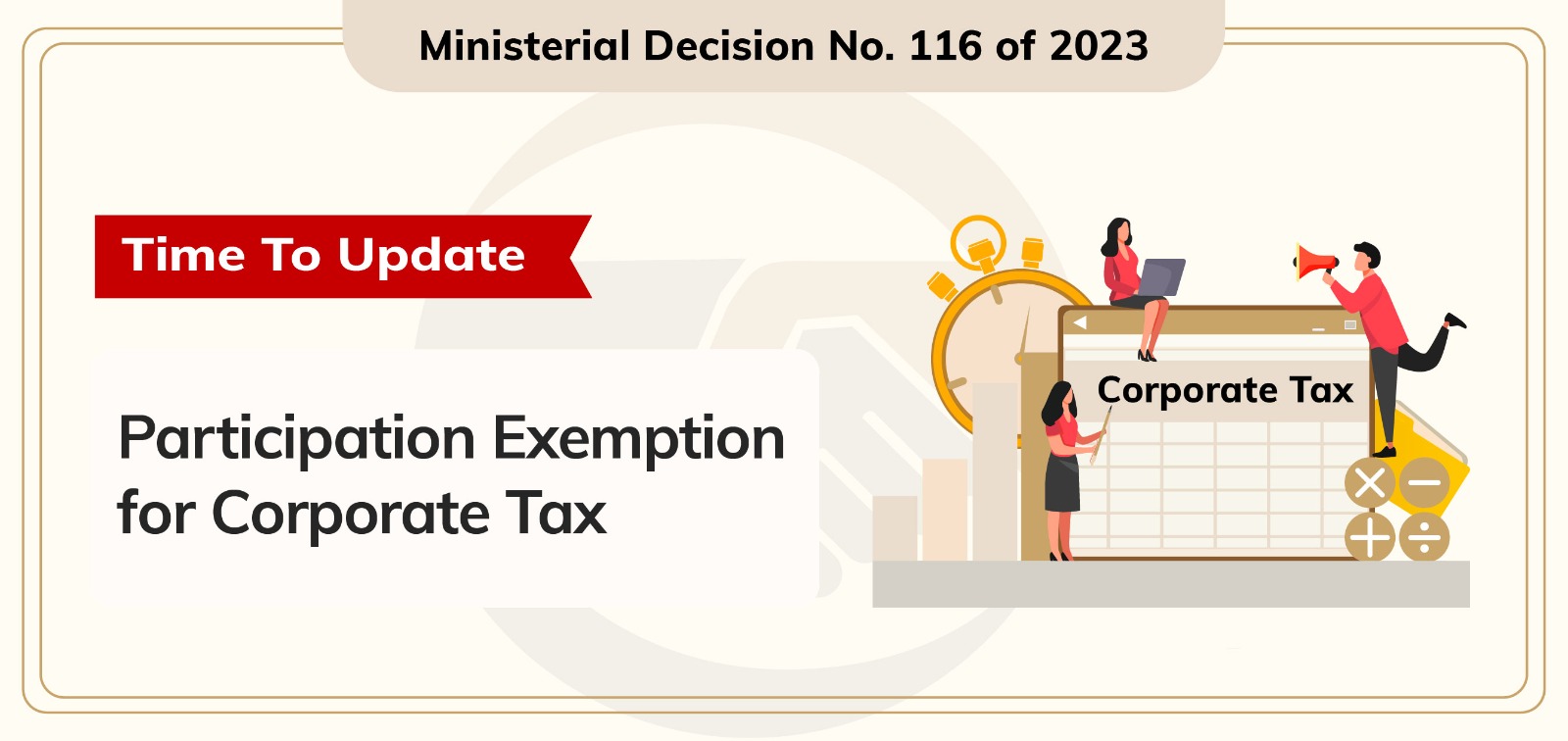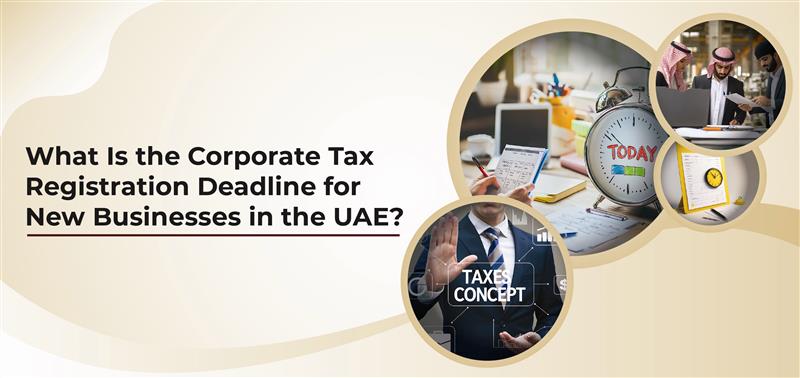
14 Jul 2023
The Ministry of Finance has issued Ministerial Decision No. 116 of 2023, which aims to simplify the participation exemption and provide valuable guidance on the taxation of corporations and businesses. This decision streamlines the tax treatment of various aspects of the participation exemption, bringing clarity and coherence to the Federal Decree-Law No. 47 of 2022.
The key points of Ministerial Decision No. 116 of 2023 are as follows:
- Definition of Ownership Interests (Article 2):
- The decision provides a comprehensive definition of ownership interests, which includes various securities and rights such as ordinary shares, preferred shares, redeemable shares, membership and partner interests, and similar instruments.
- To be recognized as an ownership interest, the interest must also be classified as an equity interest under the accounting standards applied by the Taxable Person holding the ownership interest.
- Aggregation of Ownership Interests (Article 3):
- In order to determine whether a Taxable Person possesses a Participating Interest as stated in Clause (2) of Article (23) of the Corporate Tax Law, the following guidelines are applicable:
- Different types of ownership interests in the same legal entity, as outlined in Article (2) of this Decision, shall be combined.
- Ownership interests in the same legal entity held by members of a Qualifying Group, as defined in Clause (2) of Article (26) of the Corporate Tax Law, in which the Taxable Person is a member, shall be combined with those of the Taxable Person.
- These provisions shall be implemented to determine whether the minimum ownership requirement is met under Clause (11) of Article (23) of the Corporate Tax Law.
- Transfer of Ownership Interests (Article 4):
- Article 4 clarifies the treatment of ownership interest transfers.
- It states that when a taxable person exchanges one ownership interest in a juridical person for another, these interests will be treated as a continuous ownership interest under certain conditions.
- This provision offers clarity and eliminates ambiguity or uncertainty regarding the tax treatment of such transfers.
- Treatment of Debt Instruments (Article 5):
- Article 5 focuses on debt instruments and specifies their treatment.
- If the accounting standards applied classified the Debt Instrument as equity interest, the income derived from such instruments issued by the Participation where the Taxable Person has Participating Interest will be treated as income from a participating interest.
- This provision ensures consistent treatment of income generated from debt instruments and aligns it with the participation exemption framework.
- Conditions for Taxation (Article 6):
- Article 6 introduces the conditions for participation to be considered as being subject to Tax in another country, which is of similar nature to Corporate Tax
- Participation will be considered to have met the tax requirement if they are residents for tax purposes in another country or foreign territory that levies a tax meeting specific criteria.
- These criteria include the tax being applied on a similar basis to corporate tax and levied at a rate of not less than nine percent.
- This provision prevents potential abuse of tax regulations while ensuring a fair and consistent approach to taxation.
- Requirements for Holding Companies (Article 7):
- Article 7 outlines the conditions for holding companies to benefit from the participation exemption.
- Factors such as being directed and managed in another country or foreign territory, compliance with relevant laws and regulations, and focusing primarily on activities related to acquiring and holding shares or equitable interests are highlighted.
- These requirements ensure the participation exemption targets legitimate holding companies and support the tax system's integrity.
- Minimum Acquisition Cost Threshold (Article 8):
- Article 8 sets a minimum acquisition cost threshold for a taxable person to be eligible for the participation exemption.
- If the aggregated acquisition cost of the ownership interests in a juridical person equals or exceeds AED 4,000,000 (four million dirhams), the taxable person will qualify for the exemption.
- This provision ensures that the exemption is available to substantial investments and provides a clear benchmark for determining eligibility.
- Methods for Determining Asset Conditions (Article 9):
- Article 9 offers two methods for determining whether the condition related to assets of the participation is satisfied.
- The first method involves assessing the consolidated balance sheet of the participation, while the second method allows for a market value valuation.
- This provision allows flexibility in assessing the asset conditions and ensures a fair and accurate representation of the participation's assets.
- Expenditure Related to Participating Interests (Article 10):
- Article 10 clarifies the treatment of expenditure related to the acquisition and disposal of a participating interest.
- It specifies that such expenditure, including professional fees, due diligence costs, and stamp duty, is generally not deductible except for interest expenditure, which is subject to the Corporate Tax Law.
- This provision ensures consistency in treating expenditures and prevents potential abuse of deductions.
- Exemption of Income from Participations (Article 11):
- Article 11 highlights that income derived from participation will be exempt from corporate tax if it is received by the taxable person in his capacity as an owner of ownership interest in the participation.
- This exemption encourages investment and clarifies the tax treatment of income derived from participation.
- Liquidation Proceeds and Losses (Article 12):
- Article 12 addresses the treatment of liquidation proceeds and losses.
- It states that participants will be considered liquidated if it ceases to have legal existence. It outlines the calculation of liquidation losses and the treatment of assets or liabilities transferred during liquidation.
- This provision ensures a clear and consistent tax treatment of liquidation proceeds and losses.
- Foreign Permanent Establishments (Article 13):
- Article 13 extends the scope of the decision to businesses operating a Foreign Permanent Establishment.
- It mandates that the taxable income of the Foreign Permanent Establishment should fully offset any tax losses incurred.
- Only after offsetting the losses can the taxable person elect for the Foreign Permanent Establishment exemption or take advantage of provisions related to income arising from the incorporation of the establishment under Article 23.
- This provision ensures an appropriate balance between losses and income from Foreign Permanent Establishments and prevents potential abuse of the exemption.
In conclusion, Ministerial Decision No. 116 of 2023 is a significant step towards simplifying the participation exemption for the taxation of corporations and businesses. By providing clear definitions, outlining aggregation and transfer rules, specifying conditions for taxation, addressing requirements for holding companies, setting acquisition cost thresholds, and clarifying the treatment of expenditure and exemptions, this decision brings much-needed clarity and guidance to the participation exemption framework. Moreover, its publication and effective implementation will ensure a streamlined and fair tax regime, benefiting businesses and the economy.



